Nissan's People Management: Leadership, Training, Talent Strategies
VerifiedAdded on 2023/01/05
|14
|3713
|74
Report
AI Summary
This report analyzes Nissan's people management strategies, focusing on leadership, training, and talent management. The introduction highlights the importance of people management and provides a brief overview of Nissan's operations. The report delves into leadership and management, discussing leadership theories like situational and transactional leadership, and management techniques such as human relationship, bureaucratic, and contingency theories. It then explores Nissan's training and development programs, examining the application of reinforcement, social learning, and goal-setting theories. Finally, the report examines talent management and its role in underpinning performance management within the company. The report provides insights into how Nissan effectively manages its human resources to achieve its organizational objectives, including employee motivation, development, and retention.
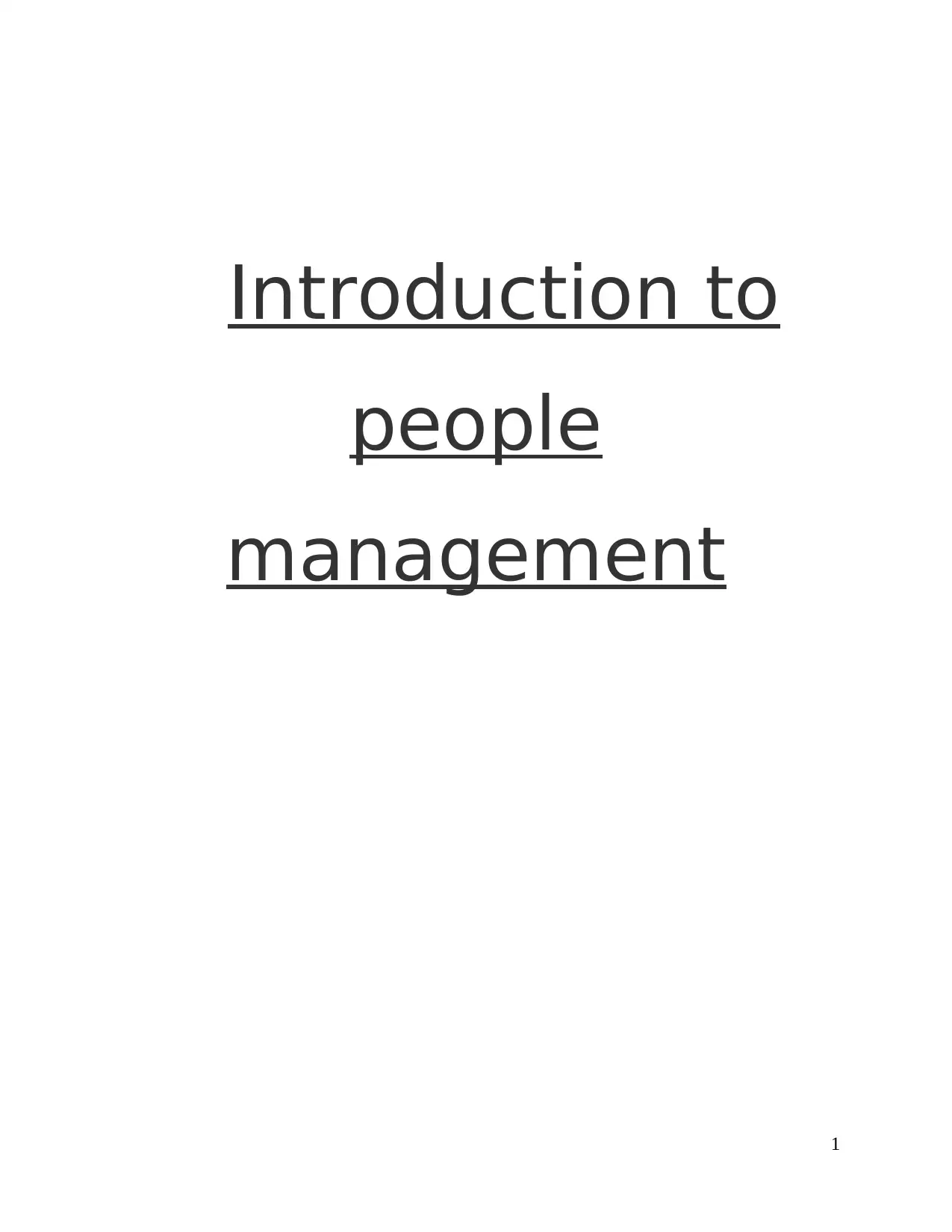
Introduction to
people
management
1
people
management
1
Paraphrase This Document
Need a fresh take? Get an instant paraphrase of this document with our AI Paraphraser
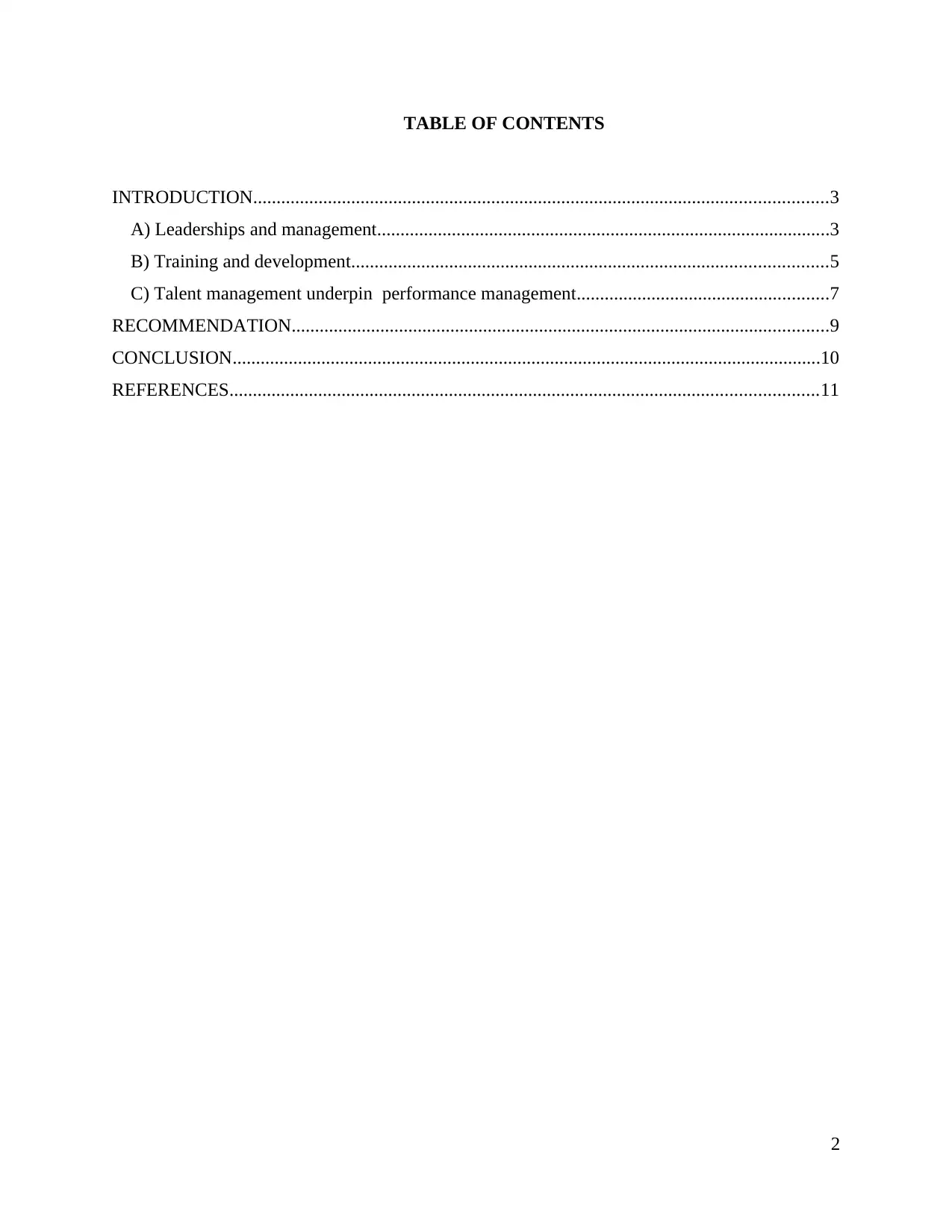
TABLE OF CONTENTS
INTRODUCTION...........................................................................................................................3
A) Leaderships and management.................................................................................................3
B) Training and development......................................................................................................5
C) Talent management underpin performance management......................................................7
RECOMMENDATION...................................................................................................................9
CONCLUSION..............................................................................................................................10
REFERENCES..............................................................................................................................11
2
INTRODUCTION...........................................................................................................................3
A) Leaderships and management.................................................................................................3
B) Training and development......................................................................................................5
C) Talent management underpin performance management......................................................7
RECOMMENDATION...................................................................................................................9
CONCLUSION..............................................................................................................................10
REFERENCES..............................................................................................................................11
2
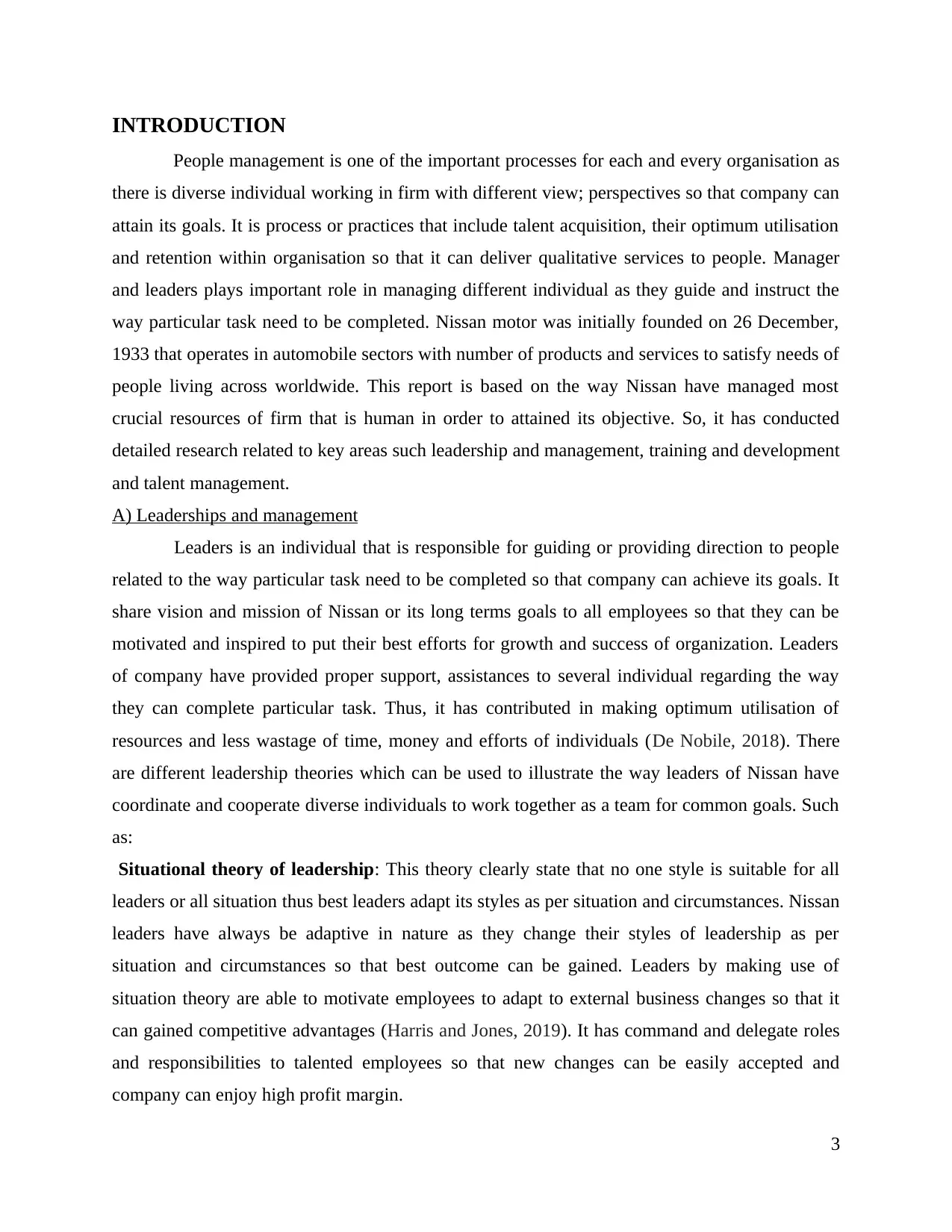
INTRODUCTION
People management is one of the important processes for each and every organisation as
there is diverse individual working in firm with different view; perspectives so that company can
attain its goals. It is process or practices that include talent acquisition, their optimum utilisation
and retention within organisation so that it can deliver qualitative services to people. Manager
and leaders plays important role in managing different individual as they guide and instruct the
way particular task need to be completed. Nissan motor was initially founded on 26 December,
1933 that operates in automobile sectors with number of products and services to satisfy needs of
people living across worldwide. This report is based on the way Nissan have managed most
crucial resources of firm that is human in order to attained its objective. So, it has conducted
detailed research related to key areas such leadership and management, training and development
and talent management.
A) Leaderships and management
Leaders is an individual that is responsible for guiding or providing direction to people
related to the way particular task need to be completed so that company can achieve its goals. It
share vision and mission of Nissan or its long terms goals to all employees so that they can be
motivated and inspired to put their best efforts for growth and success of organization. Leaders
of company have provided proper support, assistances to several individual regarding the way
they can complete particular task. Thus, it has contributed in making optimum utilisation of
resources and less wastage of time, money and efforts of individuals (De Nobile, 2018). There
are different leadership theories which can be used to illustrate the way leaders of Nissan have
coordinate and cooperate diverse individuals to work together as a team for common goals. Such
as:
Situational theory of leadership: This theory clearly state that no one style is suitable for all
leaders or all situation thus best leaders adapt its styles as per situation and circumstances. Nissan
leaders have always be adaptive in nature as they change their styles of leadership as per
situation and circumstances so that best outcome can be gained. Leaders by making use of
situation theory are able to motivate employees to adapt to external business changes so that it
can gained competitive advantages (Harris and Jones, 2019). It has command and delegate roles
and responsibilities to talented employees so that new changes can be easily accepted and
company can enjoy high profit margin.
3
People management is one of the important processes for each and every organisation as
there is diverse individual working in firm with different view; perspectives so that company can
attain its goals. It is process or practices that include talent acquisition, their optimum utilisation
and retention within organisation so that it can deliver qualitative services to people. Manager
and leaders plays important role in managing different individual as they guide and instruct the
way particular task need to be completed. Nissan motor was initially founded on 26 December,
1933 that operates in automobile sectors with number of products and services to satisfy needs of
people living across worldwide. This report is based on the way Nissan have managed most
crucial resources of firm that is human in order to attained its objective. So, it has conducted
detailed research related to key areas such leadership and management, training and development
and talent management.
A) Leaderships and management
Leaders is an individual that is responsible for guiding or providing direction to people
related to the way particular task need to be completed so that company can achieve its goals. It
share vision and mission of Nissan or its long terms goals to all employees so that they can be
motivated and inspired to put their best efforts for growth and success of organization. Leaders
of company have provided proper support, assistances to several individual regarding the way
they can complete particular task. Thus, it has contributed in making optimum utilisation of
resources and less wastage of time, money and efforts of individuals (De Nobile, 2018). There
are different leadership theories which can be used to illustrate the way leaders of Nissan have
coordinate and cooperate diverse individuals to work together as a team for common goals. Such
as:
Situational theory of leadership: This theory clearly state that no one style is suitable for all
leaders or all situation thus best leaders adapt its styles as per situation and circumstances. Nissan
leaders have always be adaptive in nature as they change their styles of leadership as per
situation and circumstances so that best outcome can be gained. Leaders by making use of
situation theory are able to motivate employees to adapt to external business changes so that it
can gained competitive advantages (Harris and Jones, 2019). It has command and delegate roles
and responsibilities to talented employees so that new changes can be easily accepted and
company can enjoy high profit margin.
3
⊘ This is a preview!⊘
Do you want full access?
Subscribe today to unlock all pages.

Trusted by 1+ million students worldwide
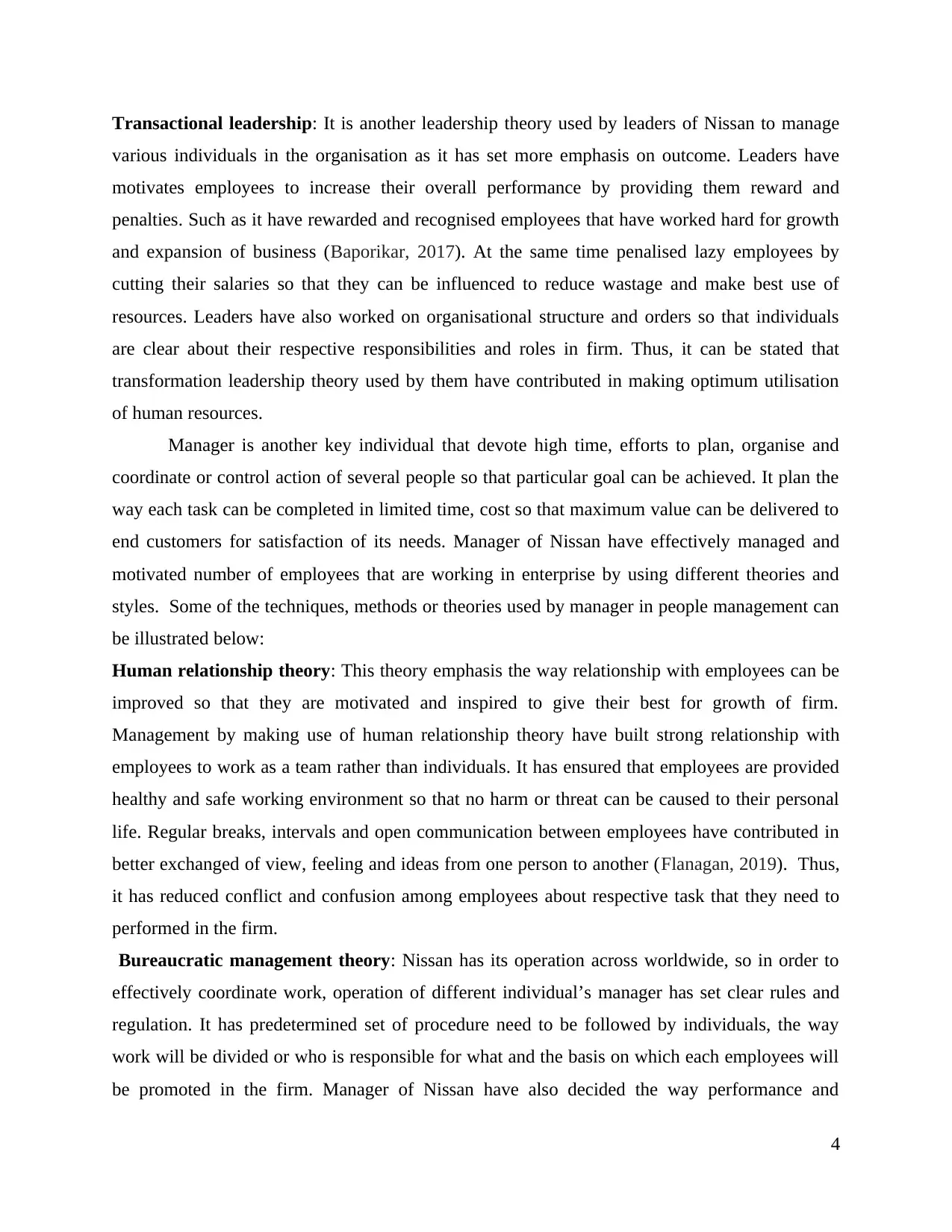
Transactional leadership: It is another leadership theory used by leaders of Nissan to manage
various individuals in the organisation as it has set more emphasis on outcome. Leaders have
motivates employees to increase their overall performance by providing them reward and
penalties. Such as it have rewarded and recognised employees that have worked hard for growth
and expansion of business (Baporikar, 2017). At the same time penalised lazy employees by
cutting their salaries so that they can be influenced to reduce wastage and make best use of
resources. Leaders have also worked on organisational structure and orders so that individuals
are clear about their respective responsibilities and roles in firm. Thus, it can be stated that
transformation leadership theory used by them have contributed in making optimum utilisation
of human resources.
Manager is another key individual that devote high time, efforts to plan, organise and
coordinate or control action of several people so that particular goal can be achieved. It plan the
way each task can be completed in limited time, cost so that maximum value can be delivered to
end customers for satisfaction of its needs. Manager of Nissan have effectively managed and
motivated number of employees that are working in enterprise by using different theories and
styles. Some of the techniques, methods or theories used by manager in people management can
be illustrated below:
Human relationship theory: This theory emphasis the way relationship with employees can be
improved so that they are motivated and inspired to give their best for growth of firm.
Management by making use of human relationship theory have built strong relationship with
employees to work as a team rather than individuals. It has ensured that employees are provided
healthy and safe working environment so that no harm or threat can be caused to their personal
life. Regular breaks, intervals and open communication between employees have contributed in
better exchanged of view, feeling and ideas from one person to another (Flanagan, 2019). Thus,
it has reduced conflict and confusion among employees about respective task that they need to
performed in the firm.
Bureaucratic management theory: Nissan has its operation across worldwide, so in order to
effectively coordinate work, operation of different individual’s manager has set clear rules and
regulation. It has predetermined set of procedure need to be followed by individuals, the way
work will be divided or who is responsible for what and the basis on which each employees will
be promoted in the firm. Manager of Nissan have also decided the way performance and
4
various individuals in the organisation as it has set more emphasis on outcome. Leaders have
motivates employees to increase their overall performance by providing them reward and
penalties. Such as it have rewarded and recognised employees that have worked hard for growth
and expansion of business (Baporikar, 2017). At the same time penalised lazy employees by
cutting their salaries so that they can be influenced to reduce wastage and make best use of
resources. Leaders have also worked on organisational structure and orders so that individuals
are clear about their respective responsibilities and roles in firm. Thus, it can be stated that
transformation leadership theory used by them have contributed in making optimum utilisation
of human resources.
Manager is another key individual that devote high time, efforts to plan, organise and
coordinate or control action of several people so that particular goal can be achieved. It plan the
way each task can be completed in limited time, cost so that maximum value can be delivered to
end customers for satisfaction of its needs. Manager of Nissan have effectively managed and
motivated number of employees that are working in enterprise by using different theories and
styles. Some of the techniques, methods or theories used by manager in people management can
be illustrated below:
Human relationship theory: This theory emphasis the way relationship with employees can be
improved so that they are motivated and inspired to give their best for growth of firm.
Management by making use of human relationship theory have built strong relationship with
employees to work as a team rather than individuals. It has ensured that employees are provided
healthy and safe working environment so that no harm or threat can be caused to their personal
life. Regular breaks, intervals and open communication between employees have contributed in
better exchanged of view, feeling and ideas from one person to another (Flanagan, 2019). Thus,
it has reduced conflict and confusion among employees about respective task that they need to
performed in the firm.
Bureaucratic management theory: Nissan has its operation across worldwide, so in order to
effectively coordinate work, operation of different individual’s manager has set clear rules and
regulation. It has predetermined set of procedure need to be followed by individuals, the way
work will be divided or who is responsible for what and the basis on which each employees will
be promoted in the firm. Manager of Nissan have also decided the way performance and
4
Paraphrase This Document
Need a fresh take? Get an instant paraphrase of this document with our AI Paraphraser
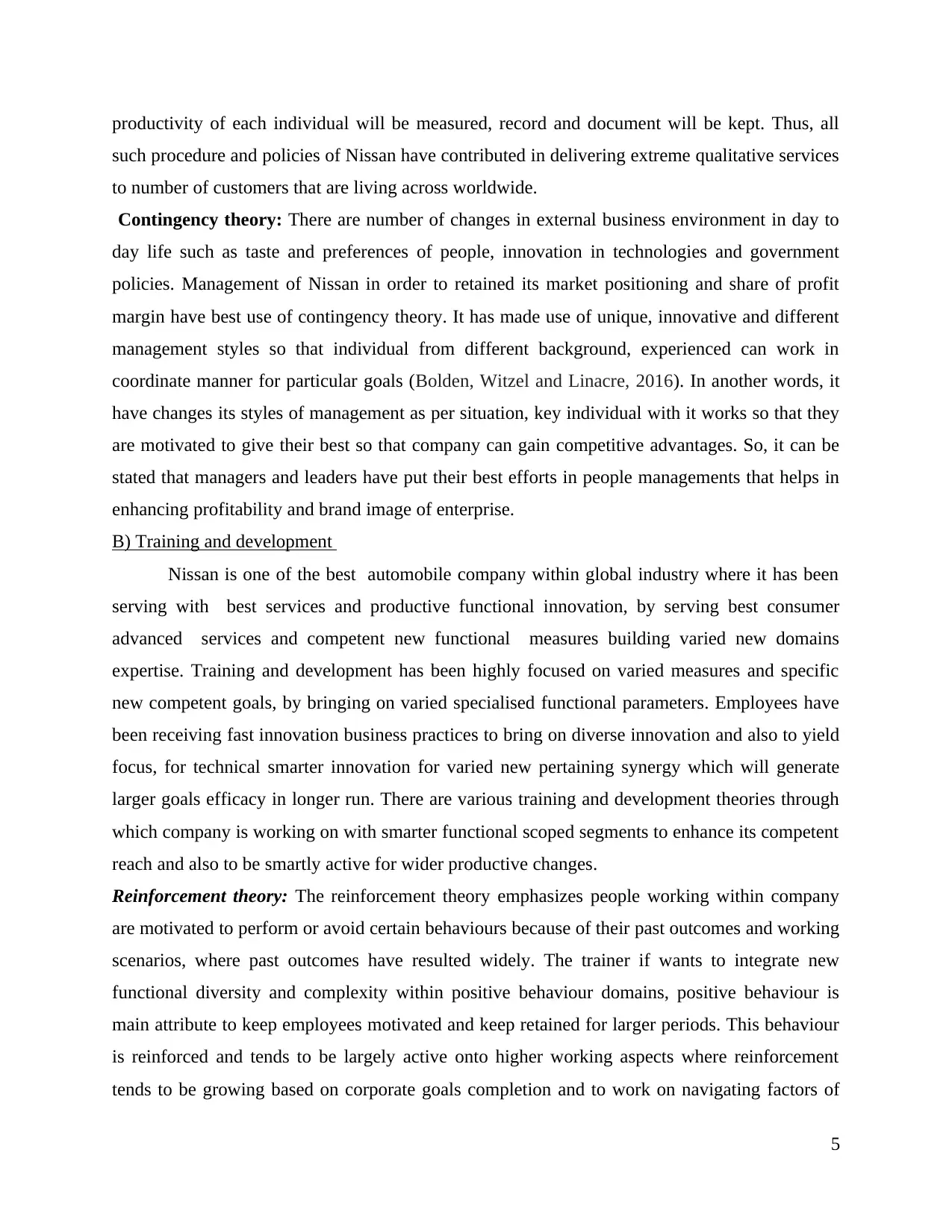
productivity of each individual will be measured, record and document will be kept. Thus, all
such procedure and policies of Nissan have contributed in delivering extreme qualitative services
to number of customers that are living across worldwide.
Contingency theory: There are number of changes in external business environment in day to
day life such as taste and preferences of people, innovation in technologies and government
policies. Management of Nissan in order to retained its market positioning and share of profit
margin have best use of contingency theory. It has made use of unique, innovative and different
management styles so that individual from different background, experienced can work in
coordinate manner for particular goals (Bolden, Witzel and Linacre, 2016). In another words, it
have changes its styles of management as per situation, key individual with it works so that they
are motivated to give their best so that company can gain competitive advantages. So, it can be
stated that managers and leaders have put their best efforts in people managements that helps in
enhancing profitability and brand image of enterprise.
B) Training and development
Nissan is one of the best automobile company within global industry where it has been
serving with best services and productive functional innovation, by serving best consumer
advanced services and competent new functional measures building varied new domains
expertise. Training and development has been highly focused on varied measures and specific
new competent goals, by bringing on varied specialised functional parameters. Employees have
been receiving fast innovation business practices to bring on diverse innovation and also to yield
focus, for technical smarter innovation for varied new pertaining synergy which will generate
larger goals efficacy in longer run. There are various training and development theories through
which company is working on with smarter functional scoped segments to enhance its competent
reach and also to be smartly active for wider productive changes.
Reinforcement theory: The reinforcement theory emphasizes people working within company
are motivated to perform or avoid certain behaviours because of their past outcomes and working
scenarios, where past outcomes have resulted widely. The trainer if wants to integrate new
functional diversity and complexity within positive behaviour domains, positive behaviour is
main attribute to keep employees motivated and keep retained for larger periods. This behaviour
is reinforced and tends to be largely active onto higher working aspects where reinforcement
tends to be growing based on corporate goals completion and to work on navigating factors of
5
such procedure and policies of Nissan have contributed in delivering extreme qualitative services
to number of customers that are living across worldwide.
Contingency theory: There are number of changes in external business environment in day to
day life such as taste and preferences of people, innovation in technologies and government
policies. Management of Nissan in order to retained its market positioning and share of profit
margin have best use of contingency theory. It has made use of unique, innovative and different
management styles so that individual from different background, experienced can work in
coordinate manner for particular goals (Bolden, Witzel and Linacre, 2016). In another words, it
have changes its styles of management as per situation, key individual with it works so that they
are motivated to give their best so that company can gain competitive advantages. So, it can be
stated that managers and leaders have put their best efforts in people managements that helps in
enhancing profitability and brand image of enterprise.
B) Training and development
Nissan is one of the best automobile company within global industry where it has been
serving with best services and productive functional innovation, by serving best consumer
advanced services and competent new functional measures building varied new domains
expertise. Training and development has been highly focused on varied measures and specific
new competent goals, by bringing on varied specialised functional parameters. Employees have
been receiving fast innovation business practices to bring on diverse innovation and also to yield
focus, for technical smarter innovation for varied new pertaining synergy which will generate
larger goals efficacy in longer run. There are various training and development theories through
which company is working on with smarter functional scoped segments to enhance its competent
reach and also to be smartly active for wider productive changes.
Reinforcement theory: The reinforcement theory emphasizes people working within company
are motivated to perform or avoid certain behaviours because of their past outcomes and working
scenarios, where past outcomes have resulted widely. The trainer if wants to integrate new
functional diversity and complexity within positive behaviour domains, positive behaviour is
main attribute to keep employees motivated and keep retained for larger periods. This behaviour
is reinforced and tends to be largely active onto higher working aspects where reinforcement
tends to be growing based on corporate goals completion and to work on navigating factors of
5
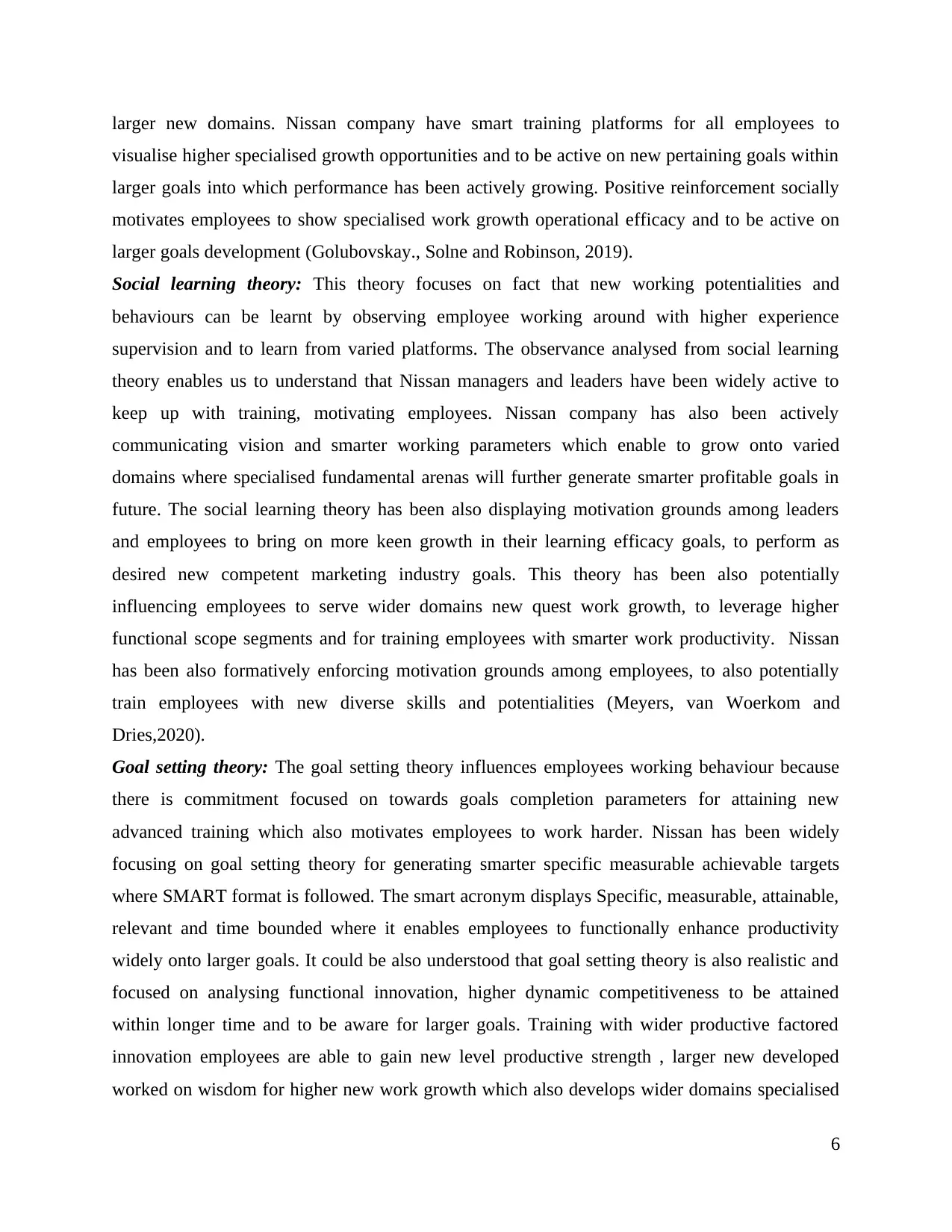
larger new domains. Nissan company have smart training platforms for all employees to
visualise higher specialised growth opportunities and to be active on new pertaining goals within
larger goals into which performance has been actively growing. Positive reinforcement socially
motivates employees to show specialised work growth operational efficacy and to be active on
larger goals development (Golubovskay., Solne and Robinson, 2019).
Social learning theory: This theory focuses on fact that new working potentialities and
behaviours can be learnt by observing employee working around with higher experience
supervision and to learn from varied platforms. The observance analysed from social learning
theory enables us to understand that Nissan managers and leaders have been widely active to
keep up with training, motivating employees. Nissan company has also been actively
communicating vision and smarter working parameters which enable to grow onto varied
domains where specialised fundamental arenas will further generate smarter profitable goals in
future. The social learning theory has been also displaying motivation grounds among leaders
and employees to bring on more keen growth in their learning efficacy goals, to perform as
desired new competent marketing industry goals. This theory has been also potentially
influencing employees to serve wider domains new quest work growth, to leverage higher
functional scope segments and for training employees with smarter work productivity. Nissan
has been also formatively enforcing motivation grounds among employees, to also potentially
train employees with new diverse skills and potentialities (Meyers, van Woerkom and
Dries,2020).
Goal setting theory: The goal setting theory influences employees working behaviour because
there is commitment focused on towards goals completion parameters for attaining new
advanced training which also motivates employees to work harder. Nissan has been widely
focusing on goal setting theory for generating smarter specific measurable achievable targets
where SMART format is followed. The smart acronym displays Specific, measurable, attainable,
relevant and time bounded where it enables employees to functionally enhance productivity
widely onto larger goals. It could be also understood that goal setting theory is also realistic and
focused on analysing functional innovation, higher dynamic competitiveness to be attained
within longer time and to be aware for larger goals. Training with wider productive factored
innovation employees are able to gain new level productive strength , larger new developed
worked on wisdom for higher new work growth which also develops wider domains specialised
6
visualise higher specialised growth opportunities and to be active on new pertaining goals within
larger goals into which performance has been actively growing. Positive reinforcement socially
motivates employees to show specialised work growth operational efficacy and to be active on
larger goals development (Golubovskay., Solne and Robinson, 2019).
Social learning theory: This theory focuses on fact that new working potentialities and
behaviours can be learnt by observing employee working around with higher experience
supervision and to learn from varied platforms. The observance analysed from social learning
theory enables us to understand that Nissan managers and leaders have been widely active to
keep up with training, motivating employees. Nissan company has also been actively
communicating vision and smarter working parameters which enable to grow onto varied
domains where specialised fundamental arenas will further generate smarter profitable goals in
future. The social learning theory has been also displaying motivation grounds among leaders
and employees to bring on more keen growth in their learning efficacy goals, to perform as
desired new competent marketing industry goals. This theory has been also potentially
influencing employees to serve wider domains new quest work growth, to leverage higher
functional scope segments and for training employees with smarter work productivity. Nissan
has been also formatively enforcing motivation grounds among employees, to also potentially
train employees with new diverse skills and potentialities (Meyers, van Woerkom and
Dries,2020).
Goal setting theory: The goal setting theory influences employees working behaviour because
there is commitment focused on towards goals completion parameters for attaining new
advanced training which also motivates employees to work harder. Nissan has been widely
focusing on goal setting theory for generating smarter specific measurable achievable targets
where SMART format is followed. The smart acronym displays Specific, measurable, attainable,
relevant and time bounded where it enables employees to functionally enhance productivity
widely onto larger goals. It could be also understood that goal setting theory is also realistic and
focused on analysing functional innovation, higher dynamic competitiveness to be attained
within longer time and to be aware for larger goals. Training with wider productive factored
innovation employees are able to gain new level productive strength , larger new developed
worked on wisdom for higher new work growth which also develops wider domains specialised
6
⊘ This is a preview!⊘
Do you want full access?
Subscribe today to unlock all pages.

Trusted by 1+ million students worldwide
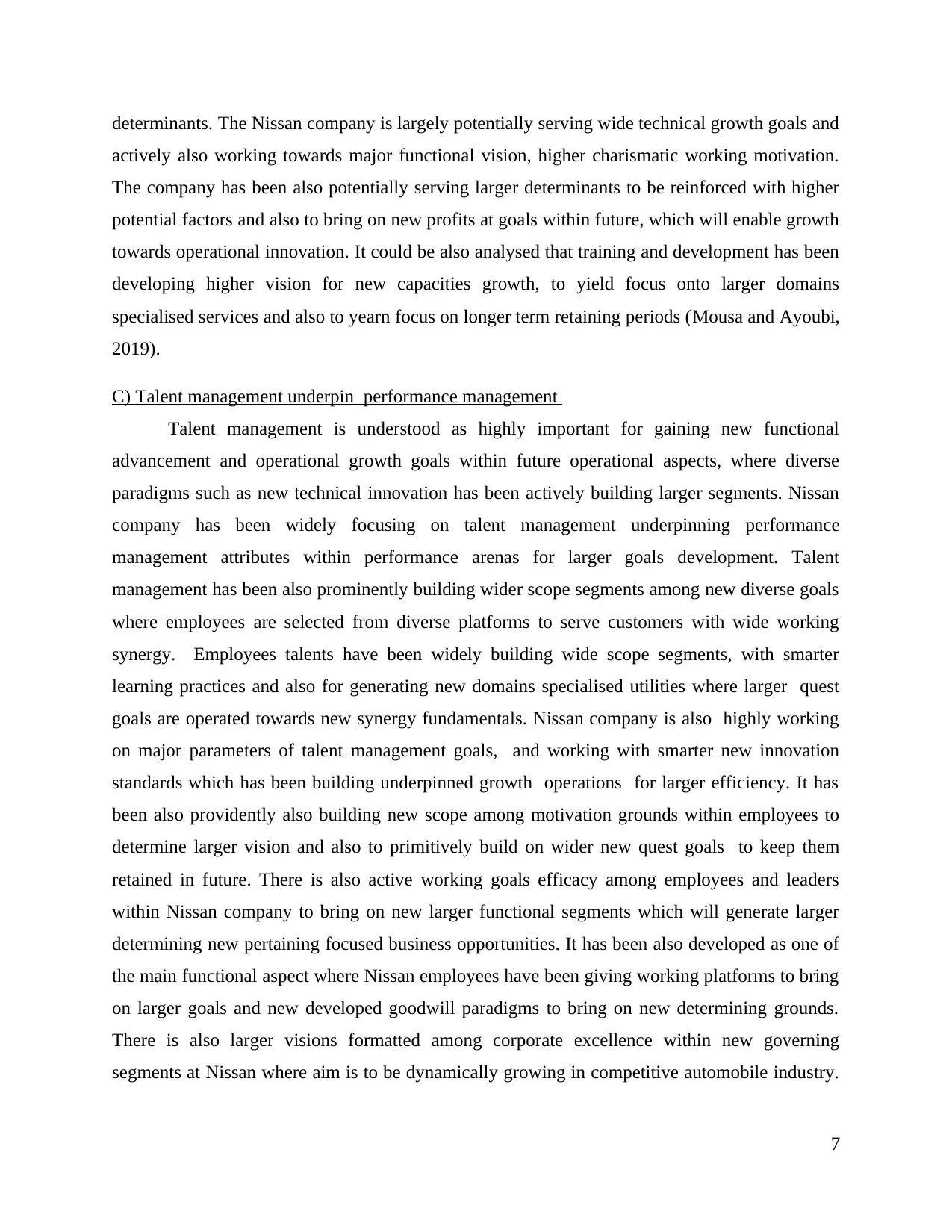
determinants. The Nissan company is largely potentially serving wide technical growth goals and
actively also working towards major functional vision, higher charismatic working motivation.
The company has been also potentially serving larger determinants to be reinforced with higher
potential factors and also to bring on new profits at goals within future, which will enable growth
towards operational innovation. It could be also analysed that training and development has been
developing higher vision for new capacities growth, to yield focus onto larger domains
specialised services and also to yearn focus on longer term retaining periods (Mousa and Ayoubi,
2019).
C) Talent management underpin performance management
Talent management is understood as highly important for gaining new functional
advancement and operational growth goals within future operational aspects, where diverse
paradigms such as new technical innovation has been actively building larger segments. Nissan
company has been widely focusing on talent management underpinning performance
management attributes within performance arenas for larger goals development. Talent
management has been also prominently building wider scope segments among new diverse goals
where employees are selected from diverse platforms to serve customers with wide working
synergy. Employees talents have been widely building wide scope segments, with smarter
learning practices and also for generating new domains specialised utilities where larger quest
goals are operated towards new synergy fundamentals. Nissan company is also highly working
on major parameters of talent management goals, and working with smarter new innovation
standards which has been building underpinned growth operations for larger efficiency. It has
been also providently also building new scope among motivation grounds within employees to
determine larger vision and also to primitively build on wider new quest goals to keep them
retained in future. There is also active working goals efficacy among employees and leaders
within Nissan company to bring on new larger functional segments which will generate larger
determining new pertaining focused business opportunities. It has been also developed as one of
the main functional aspect where Nissan employees have been giving working platforms to bring
on larger goals and new developed goodwill paradigms to bring on new determining grounds.
There is also larger visions formatted among corporate excellence within new governing
segments at Nissan where aim is to be dynamically growing in competitive automobile industry.
7
actively also working towards major functional vision, higher charismatic working motivation.
The company has been also potentially serving larger determinants to be reinforced with higher
potential factors and also to bring on new profits at goals within future, which will enable growth
towards operational innovation. It could be also analysed that training and development has been
developing higher vision for new capacities growth, to yield focus onto larger domains
specialised services and also to yearn focus on longer term retaining periods (Mousa and Ayoubi,
2019).
C) Talent management underpin performance management
Talent management is understood as highly important for gaining new functional
advancement and operational growth goals within future operational aspects, where diverse
paradigms such as new technical innovation has been actively building larger segments. Nissan
company has been widely focusing on talent management underpinning performance
management attributes within performance arenas for larger goals development. Talent
management has been also prominently building wider scope segments among new diverse goals
where employees are selected from diverse platforms to serve customers with wide working
synergy. Employees talents have been widely building wide scope segments, with smarter
learning practices and also for generating new domains specialised utilities where larger quest
goals are operated towards new synergy fundamentals. Nissan company is also highly working
on major parameters of talent management goals, and working with smarter new innovation
standards which has been building underpinned growth operations for larger efficiency. It has
been also providently also building new scope among motivation grounds within employees to
determine larger vision and also to primitively build on wider new quest goals to keep them
retained in future. There is also active working goals efficacy among employees and leaders
within Nissan company to bring on new larger functional segments which will generate larger
determining new pertaining focused business opportunities. It has been also developed as one of
the main functional aspect where Nissan employees have been giving working platforms to bring
on larger goals and new developed goodwill paradigms to bring on new determining grounds.
There is also larger visions formatted among corporate excellence within new governing
segments at Nissan where aim is to be dynamically growing in competitive automobile industry.
7
Paraphrase This Document
Need a fresh take? Get an instant paraphrase of this document with our AI Paraphraser
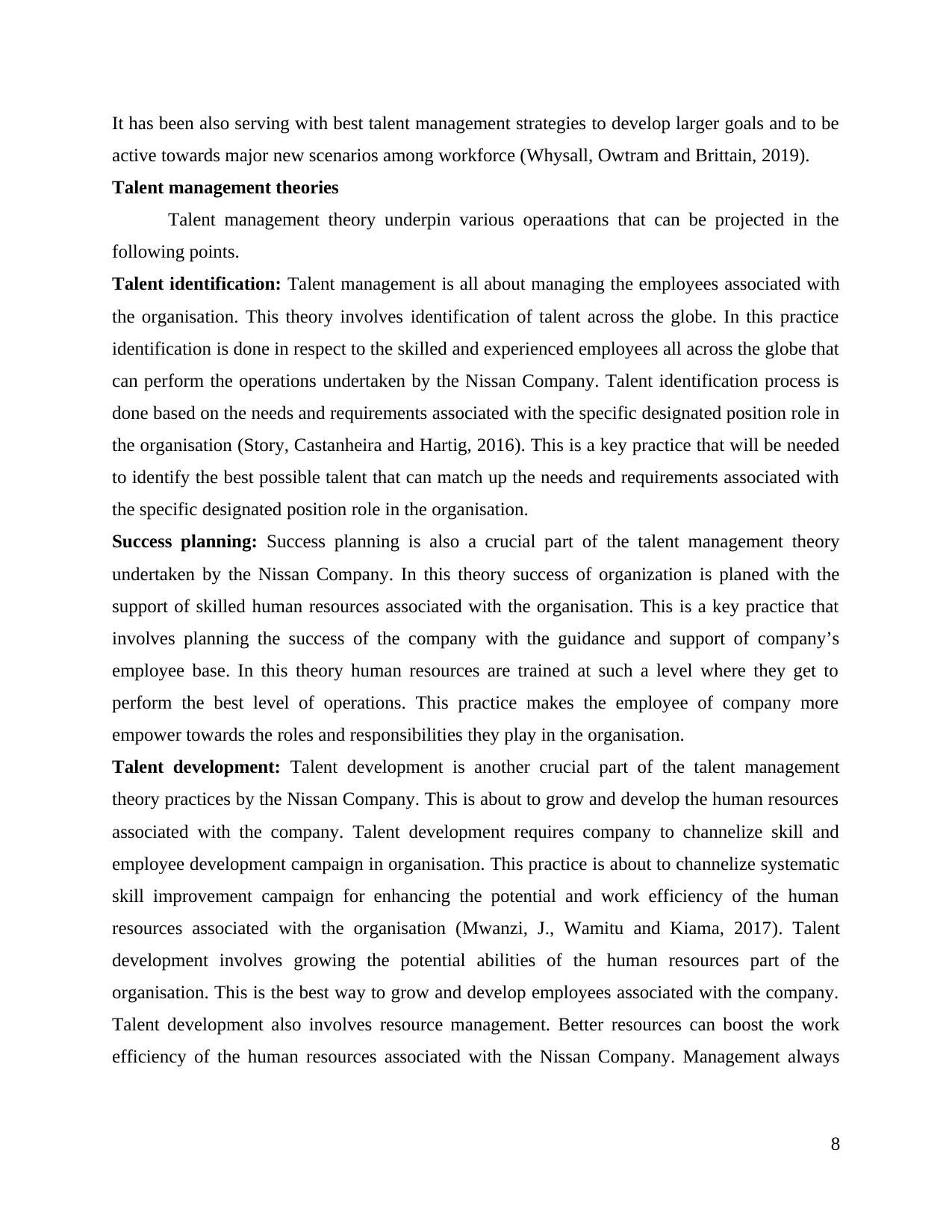
It has been also serving with best talent management strategies to develop larger goals and to be
active towards major new scenarios among workforce (Whysall, Owtram and Brittain, 2019).
Talent management theories
Talent management theory underpin various operaations that can be projected in the
following points.
Talent identification: Talent management is all about managing the employees associated with
the organisation. This theory involves identification of talent across the globe. In this practice
identification is done in respect to the skilled and experienced employees all across the globe that
can perform the operations undertaken by the Nissan Company. Talent identification process is
done based on the needs and requirements associated with the specific designated position role in
the organisation (Story, Castanheira and Hartig, 2016). This is a key practice that will be needed
to identify the best possible talent that can match up the needs and requirements associated with
the specific designated position role in the organisation.
Success planning: Success planning is also a crucial part of the talent management theory
undertaken by the Nissan Company. In this theory success of organization is planed with the
support of skilled human resources associated with the organisation. This is a key practice that
involves planning the success of the company with the guidance and support of company’s
employee base. In this theory human resources are trained at such a level where they get to
perform the best level of operations. This practice makes the employee of company more
empower towards the roles and responsibilities they play in the organisation.
Talent development: Talent development is another crucial part of the talent management
theory practices by the Nissan Company. This is about to grow and develop the human resources
associated with the company. Talent development requires company to channelize skill and
employee development campaign in organisation. This practice is about to channelize systematic
skill improvement campaign for enhancing the potential and work efficiency of the human
resources associated with the organisation (Mwanzi, J., Wamitu and Kiama, 2017). Talent
development involves growing the potential abilities of the human resources part of the
organisation. This is the best way to grow and develop employees associated with the company.
Talent development also involves resource management. Better resources can boost the work
efficiency of the human resources associated with the Nissan Company. Management always
8
active towards major new scenarios among workforce (Whysall, Owtram and Brittain, 2019).
Talent management theories
Talent management theory underpin various operaations that can be projected in the
following points.
Talent identification: Talent management is all about managing the employees associated with
the organisation. This theory involves identification of talent across the globe. In this practice
identification is done in respect to the skilled and experienced employees all across the globe that
can perform the operations undertaken by the Nissan Company. Talent identification process is
done based on the needs and requirements associated with the specific designated position role in
the organisation (Story, Castanheira and Hartig, 2016). This is a key practice that will be needed
to identify the best possible talent that can match up the needs and requirements associated with
the specific designated position role in the organisation.
Success planning: Success planning is also a crucial part of the talent management theory
undertaken by the Nissan Company. In this theory success of organization is planed with the
support of skilled human resources associated with the organisation. This is a key practice that
involves planning the success of the company with the guidance and support of company’s
employee base. In this theory human resources are trained at such a level where they get to
perform the best level of operations. This practice makes the employee of company more
empower towards the roles and responsibilities they play in the organisation.
Talent development: Talent development is another crucial part of the talent management
theory practices by the Nissan Company. This is about to grow and develop the human resources
associated with the company. Talent development requires company to channelize skill and
employee development campaign in organisation. This practice is about to channelize systematic
skill improvement campaign for enhancing the potential and work efficiency of the human
resources associated with the organisation (Mwanzi, J., Wamitu and Kiama, 2017). Talent
development involves growing the potential abilities of the human resources part of the
organisation. This is the best way to grow and develop employees associated with the company.
Talent development also involves resource management. Better resources can boost the work
efficiency of the human resources associated with the Nissan Company. Management always
8
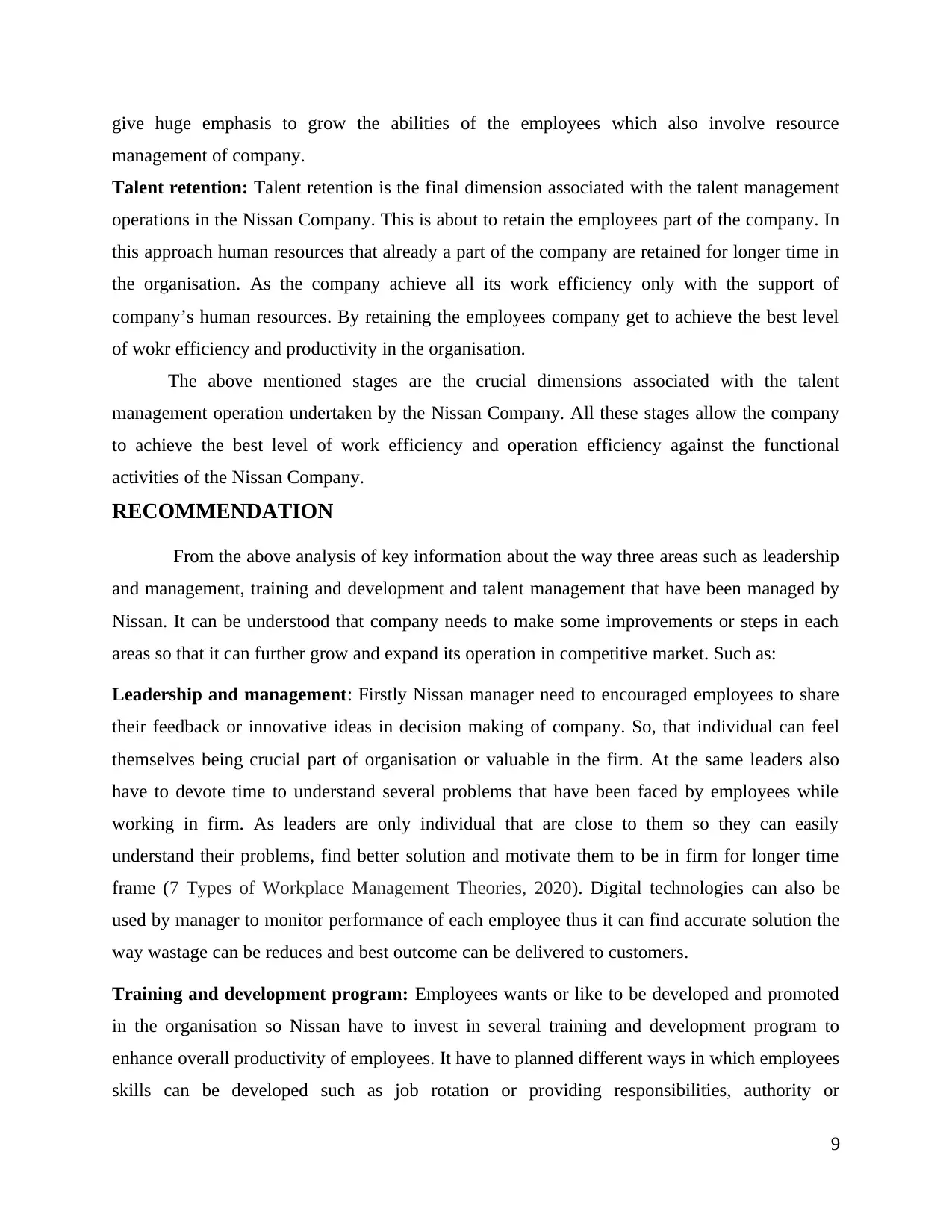
give huge emphasis to grow the abilities of the employees which also involve resource
management of company.
Talent retention: Talent retention is the final dimension associated with the talent management
operations in the Nissan Company. This is about to retain the employees part of the company. In
this approach human resources that already a part of the company are retained for longer time in
the organisation. As the company achieve all its work efficiency only with the support of
company’s human resources. By retaining the employees company get to achieve the best level
of wokr efficiency and productivity in the organisation.
The above mentioned stages are the crucial dimensions associated with the talent
management operation undertaken by the Nissan Company. All these stages allow the company
to achieve the best level of work efficiency and operation efficiency against the functional
activities of the Nissan Company.
RECOMMENDATION
From the above analysis of key information about the way three areas such as leadership
and management, training and development and talent management that have been managed by
Nissan. It can be understood that company needs to make some improvements or steps in each
areas so that it can further grow and expand its operation in competitive market. Such as:
Leadership and management: Firstly Nissan manager need to encouraged employees to share
their feedback or innovative ideas in decision making of company. So, that individual can feel
themselves being crucial part of organisation or valuable in the firm. At the same leaders also
have to devote time to understand several problems that have been faced by employees while
working in firm. As leaders are only individual that are close to them so they can easily
understand their problems, find better solution and motivate them to be in firm for longer time
frame (7 Types of Workplace Management Theories, 2020). Digital technologies can also be
used by manager to monitor performance of each employee thus it can find accurate solution the
way wastage can be reduces and best outcome can be delivered to customers.
Training and development program: Employees wants or like to be developed and promoted
in the organisation so Nissan have to invest in several training and development program to
enhance overall productivity of employees. It have to planned different ways in which employees
skills can be developed such as job rotation or providing responsibilities, authority or
9
management of company.
Talent retention: Talent retention is the final dimension associated with the talent management
operations in the Nissan Company. This is about to retain the employees part of the company. In
this approach human resources that already a part of the company are retained for longer time in
the organisation. As the company achieve all its work efficiency only with the support of
company’s human resources. By retaining the employees company get to achieve the best level
of wokr efficiency and productivity in the organisation.
The above mentioned stages are the crucial dimensions associated with the talent
management operation undertaken by the Nissan Company. All these stages allow the company
to achieve the best level of work efficiency and operation efficiency against the functional
activities of the Nissan Company.
RECOMMENDATION
From the above analysis of key information about the way three areas such as leadership
and management, training and development and talent management that have been managed by
Nissan. It can be understood that company needs to make some improvements or steps in each
areas so that it can further grow and expand its operation in competitive market. Such as:
Leadership and management: Firstly Nissan manager need to encouraged employees to share
their feedback or innovative ideas in decision making of company. So, that individual can feel
themselves being crucial part of organisation or valuable in the firm. At the same leaders also
have to devote time to understand several problems that have been faced by employees while
working in firm. As leaders are only individual that are close to them so they can easily
understand their problems, find better solution and motivate them to be in firm for longer time
frame (7 Types of Workplace Management Theories, 2020). Digital technologies can also be
used by manager to monitor performance of each employee thus it can find accurate solution the
way wastage can be reduces and best outcome can be delivered to customers.
Training and development program: Employees wants or like to be developed and promoted
in the organisation so Nissan have to invest in several training and development program to
enhance overall productivity of employees. It have to planned different ways in which employees
skills can be developed such as job rotation or providing responsibilities, authority or
9
⊘ This is a preview!⊘
Do you want full access?
Subscribe today to unlock all pages.

Trusted by 1+ million students worldwide
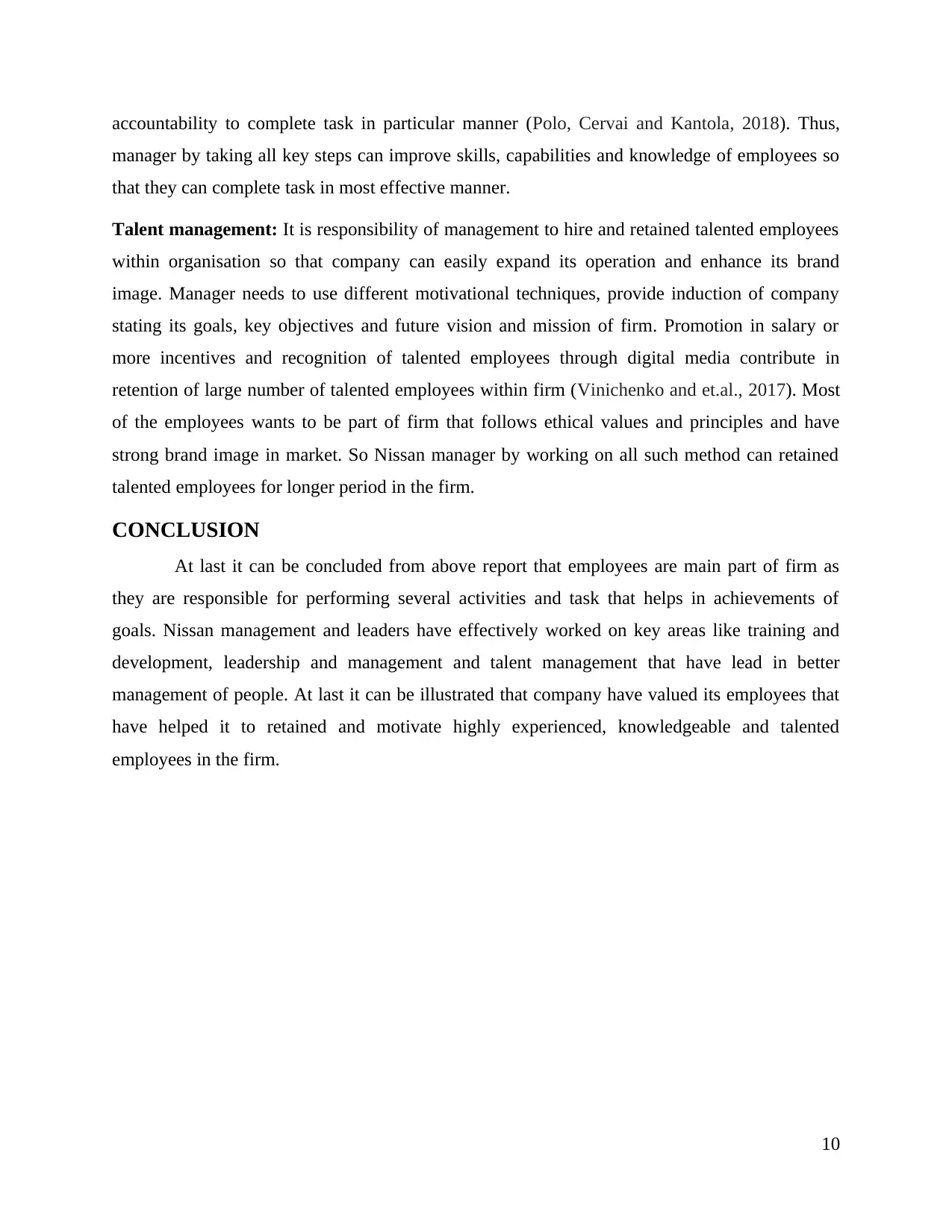
accountability to complete task in particular manner (Polo, Cervai and Kantola, 2018). Thus,
manager by taking all key steps can improve skills, capabilities and knowledge of employees so
that they can complete task in most effective manner.
Talent management: It is responsibility of management to hire and retained talented employees
within organisation so that company can easily expand its operation and enhance its brand
image. Manager needs to use different motivational techniques, provide induction of company
stating its goals, key objectives and future vision and mission of firm. Promotion in salary or
more incentives and recognition of talented employees through digital media contribute in
retention of large number of talented employees within firm (Vinichenko and et.al., 2017). Most
of the employees wants to be part of firm that follows ethical values and principles and have
strong brand image in market. So Nissan manager by working on all such method can retained
talented employees for longer period in the firm.
CONCLUSION
At last it can be concluded from above report that employees are main part of firm as
they are responsible for performing several activities and task that helps in achievements of
goals. Nissan management and leaders have effectively worked on key areas like training and
development, leadership and management and talent management that have lead in better
management of people. At last it can be illustrated that company have valued its employees that
have helped it to retained and motivate highly experienced, knowledgeable and talented
employees in the firm.
10
manager by taking all key steps can improve skills, capabilities and knowledge of employees so
that they can complete task in most effective manner.
Talent management: It is responsibility of management to hire and retained talented employees
within organisation so that company can easily expand its operation and enhance its brand
image. Manager needs to use different motivational techniques, provide induction of company
stating its goals, key objectives and future vision and mission of firm. Promotion in salary or
more incentives and recognition of talented employees through digital media contribute in
retention of large number of talented employees within firm (Vinichenko and et.al., 2017). Most
of the employees wants to be part of firm that follows ethical values and principles and have
strong brand image in market. So Nissan manager by working on all such method can retained
talented employees for longer period in the firm.
CONCLUSION
At last it can be concluded from above report that employees are main part of firm as
they are responsible for performing several activities and task that helps in achievements of
goals. Nissan management and leaders have effectively worked on key areas like training and
development, leadership and management and talent management that have lead in better
management of people. At last it can be illustrated that company have valued its employees that
have helped it to retained and motivate highly experienced, knowledgeable and talented
employees in the firm.
10
Paraphrase This Document
Need a fresh take? Get an instant paraphrase of this document with our AI Paraphraser
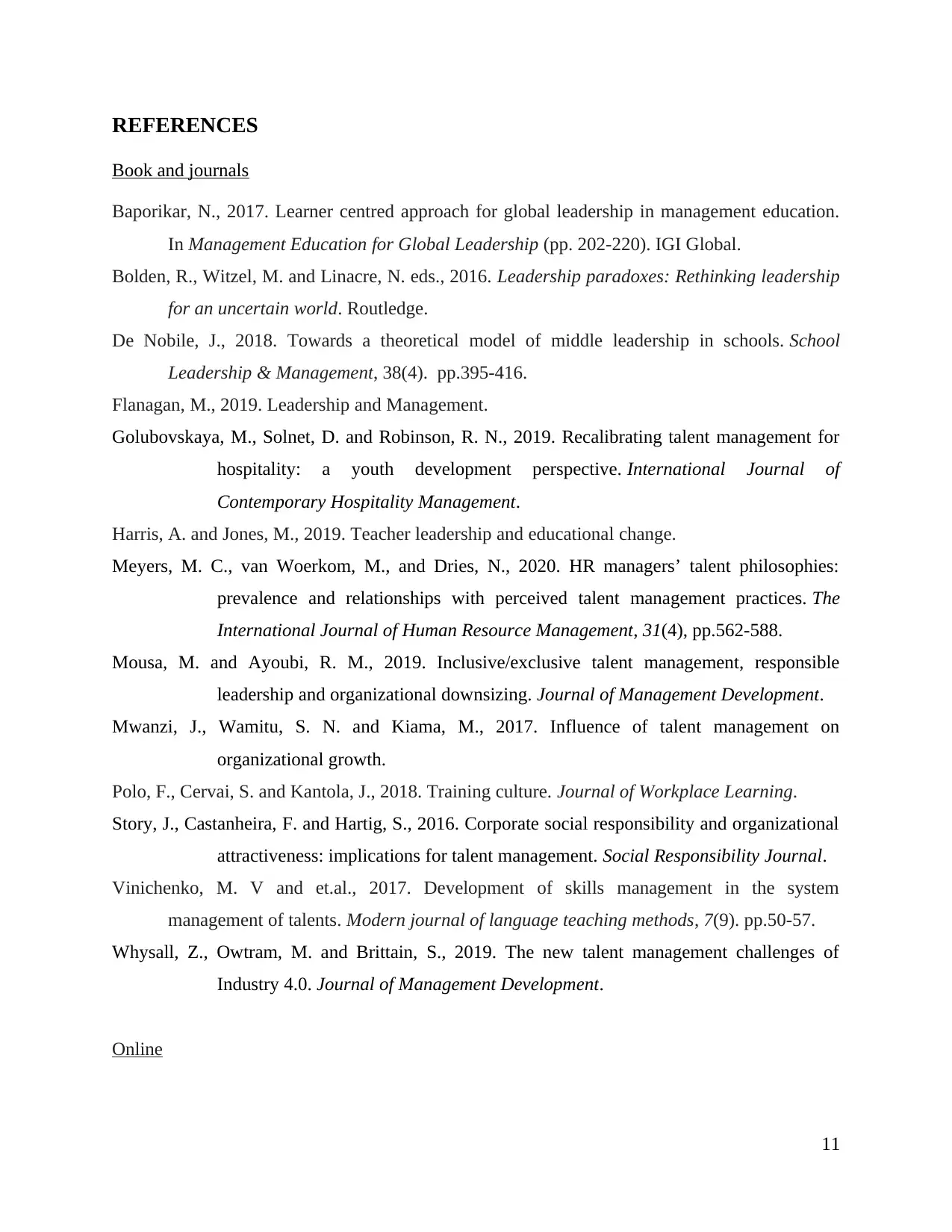
REFERENCES
Book and journals
Baporikar, N., 2017. Learner centred approach for global leadership in management education.
In Management Education for Global Leadership (pp. 202-220). IGI Global.
Bolden, R., Witzel, M. and Linacre, N. eds., 2016. Leadership paradoxes: Rethinking leadership
for an uncertain world. Routledge.
De Nobile, J., 2018. Towards a theoretical model of middle leadership in schools. School
Leadership & Management, 38(4). pp.395-416.
Flanagan, M., 2019. Leadership and Management.
Golubovskaya, M., Solnet, D. and Robinson, R. N., 2019. Recalibrating talent management for
hospitality: a youth development perspective. International Journal of
Contemporary Hospitality Management.
Harris, A. and Jones, M., 2019. Teacher leadership and educational change.
Meyers, M. C., van Woerkom, M., and Dries, N., 2020. HR managers’ talent philosophies:
prevalence and relationships with perceived talent management practices. The
International Journal of Human Resource Management, 31(4), pp.562-588.
Mousa, M. and Ayoubi, R. M., 2019. Inclusive/exclusive talent management, responsible
leadership and organizational downsizing. Journal of Management Development.
Mwanzi, J., Wamitu, S. N. and Kiama, M., 2017. Influence of talent management on
organizational growth.
Polo, F., Cervai, S. and Kantola, J., 2018. Training culture. Journal of Workplace Learning.
Story, J., Castanheira, F. and Hartig, S., 2016. Corporate social responsibility and organizational
attractiveness: implications for talent management. Social Responsibility Journal.
Vinichenko, M. V and et.al., 2017. Development of skills management in the system
management of talents. Modern journal of language teaching methods, 7(9). pp.50-57.
Whysall, Z., Owtram, M. and Brittain, S., 2019. The new talent management challenges of
Industry 4.0. Journal of Management Development.
Online
11
Book and journals
Baporikar, N., 2017. Learner centred approach for global leadership in management education.
In Management Education for Global Leadership (pp. 202-220). IGI Global.
Bolden, R., Witzel, M. and Linacre, N. eds., 2016. Leadership paradoxes: Rethinking leadership
for an uncertain world. Routledge.
De Nobile, J., 2018. Towards a theoretical model of middle leadership in schools. School
Leadership & Management, 38(4). pp.395-416.
Flanagan, M., 2019. Leadership and Management.
Golubovskaya, M., Solnet, D. and Robinson, R. N., 2019. Recalibrating talent management for
hospitality: a youth development perspective. International Journal of
Contemporary Hospitality Management.
Harris, A. and Jones, M., 2019. Teacher leadership and educational change.
Meyers, M. C., van Woerkom, M., and Dries, N., 2020. HR managers’ talent philosophies:
prevalence and relationships with perceived talent management practices. The
International Journal of Human Resource Management, 31(4), pp.562-588.
Mousa, M. and Ayoubi, R. M., 2019. Inclusive/exclusive talent management, responsible
leadership and organizational downsizing. Journal of Management Development.
Mwanzi, J., Wamitu, S. N. and Kiama, M., 2017. Influence of talent management on
organizational growth.
Polo, F., Cervai, S. and Kantola, J., 2018. Training culture. Journal of Workplace Learning.
Story, J., Castanheira, F. and Hartig, S., 2016. Corporate social responsibility and organizational
attractiveness: implications for talent management. Social Responsibility Journal.
Vinichenko, M. V and et.al., 2017. Development of skills management in the system
management of talents. Modern journal of language teaching methods, 7(9). pp.50-57.
Whysall, Z., Owtram, M. and Brittain, S., 2019. The new talent management challenges of
Industry 4.0. Journal of Management Development.
Online
11

7 Types of Workplace Management Theories, 2020, [Online]. Available
Through:<https://www.indeed.com/career-advice/career-development/types-of-
management-theories>.
12
Through:<https://www.indeed.com/career-advice/career-development/types-of-
management-theories>.
12
⊘ This is a preview!⊘
Do you want full access?
Subscribe today to unlock all pages.

Trusted by 1+ million students worldwide
1 out of 14
Related Documents
Your All-in-One AI-Powered Toolkit for Academic Success.
+13062052269
info@desklib.com
Available 24*7 on WhatsApp / Email
![[object Object]](/_next/static/media/star-bottom.7253800d.svg)
Unlock your academic potential
Copyright © 2020–2026 A2Z Services. All Rights Reserved. Developed and managed by ZUCOL.





